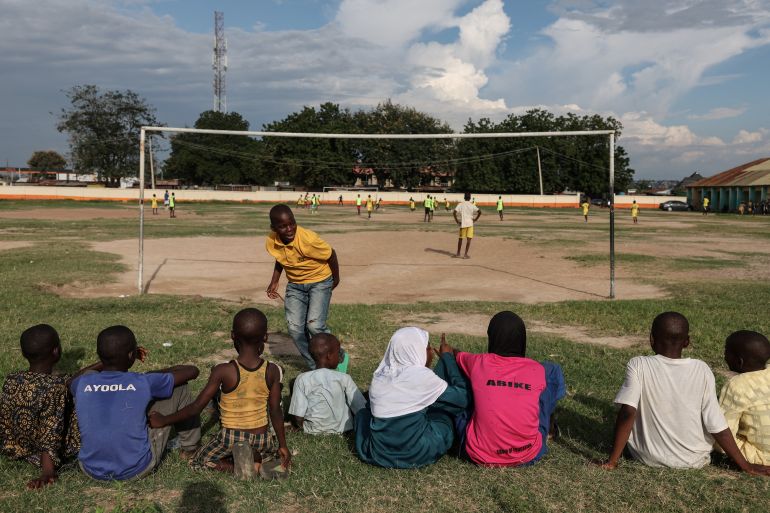Some young women in Kwara, a state with a Muslim majority and where religious customs rule daily life, are defying cultural norms by playing football.
They have discovered the sport’s camaraderie, competitive spirit, and emotional journey, but critics have expressed reservations about its suitability for women with modest clothing.
Maryam Muhammed, 17, endures the intense heat, which her hijab and leggings make more difficult, as well as community criticism, when she arrives for practice at the Model Queens Football Academy in Ilorin.
“They tell me that I won’t succeed,” I say. But she persists in saying, “But I believe I will achieve something great,” despite being frequently taunted while training.
She is unable to agree to wear modest clothing while playing, despite it being occasionally uncomfortable.
She explained that “sometime it feels like I want to open the hijab, but I have to keep my hair a secret.” I must practice it as a decent Muslim.
Hijabs were initially prohibited by FIFA in 2007 on safety grounds, leading to the disqualification of Iran’s women’s team from a 2012 Olympic qualifier. The restriction was lifted in 2014 and was fully lifted in 2012. Nouhaila Benzina, the first senior women’s World Cup player to wear a hijab, became famous in 2023 as a result.
Maryam’s mother, Kehinde Muhammed, has withstanded criticism for backing her daughter’s passion. She admitted that “so many people discouraged me.” However, I respect the choices of my kids. I continue to pray for her and support her.
She specializes in making custom hijabs and matching team shirts, stating, “I advise her that this is the customary way to dress as a Muslim.”
Muyhideen Abdulwahab, a coach for the model queens, works to alter attitudes in the community. He said, “We go out to meet parents and tell them that modest dressing is permitted.” Some still say no despite that.
Bashirat Omotosho, a 19-year-old football player, juggling her family duties and her love for football. She frequently skips training to support her mother by selling puff puff, a fried dough snack, at their roadside stall.
While serving customers and observing her teammates jog past during practice, she said, “Training is frequently in the morning, but I have to be here.” My mother and I cannot leave because of this.
Bashirat’s mother, Titilayo Omotosho, initially opposed her daughter’s athletic ambitions.
What makes a woman choose football? she questioned.
After her husband’s approval and seeing successful Muslim players like Nigerian star Asisat Oshoala, Omotosho’s stance became less oblique. She cited the record-holder six-time African Women’s Footballer of the Year, saying, “Seeing other Muslim girls succeed, like Asisat, encouraged us to let her play.” Oshoala, who plays without a hijab, is from southwest Nigeria, where traditional Islamic customs are less rigid.
Despite growing interest, female participation in Ilorin continues to be a problem, according to local football administrator Ambali Abdulrazak.
The Nigeria Women’s Football League (NWFL), which is made up of southern clubs from Lagos and Port Harcourt, have the best infrastructure and social support. Although growing grassroots initiatives are being implemented, northern and central regions still face cultural and religious restrictions.
Women’s football is becoming more popular all over the country as a result of the success of the national team, increased sponsorship opportunities, and development initiatives. According to Nigerian media company iTelemedia, which tracks audience trends across local leagues, NWFL viewership has increased by 40% since 2020, and match attendance has increased by 35% in 2024.
As the sun sets, Muhammed and her teammates practiced on a sandy school pitch as the sun sets, their voices mingling with the muezzin’s prayer from a nearby mosque.
In a youth tournament final, Muhammed led the Model Queens, but they lost. She cheered and cheered with her teammates as they won the medals in the second place competition, but she later cried by herself in her room.
Source: Aljazeera

Leave a Reply